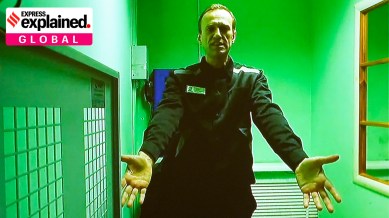How Russia’s tallest opposition leader has ‘vanished’ from prison
Who is Alexei Navalny? Why is he in prison? How did he become Putin’s ‘biggest’ rival? And why is he suddenly ‘missing’?

Alexei Navalny, vociferous Vladimir Putin critic and Russia’s tallest opposition figure, has ‘vanished’ from the penal colony where he was serving a 19-year term on charges of extremism.
Worries about Navalny spread Monday (December 11) after prison officials said he was no longer on the inmate roster, the Associated Press reported. Navalny’s spokeswoman Kira Yarmysh has claimed that no one has been able to contact him for a week now.
monthly limit of free stories.
with an Express account.
Russian authorities have announced that he has been moved from Penal Colony No. 6, in the town of Melekhovo, some 230 km east of Moscow. But they have not disclosed where he has been taken.
In context of Putin’s re-election bid
Prison transfers in Russia are frequent and notoriously secretive, with authorities providing no information about the whereabouts of inmates for weeks after they have been shifted. Yarmysh said that Navalny’s team will now look for him in the 30-odd penal colonies spread across Russia.
“They will try to hide him as long as possible,” Yarmysh told the AP, pointing to President Putin’s decision to seek another six-year term in office in next year’s elections announced to the public on Friday (December 8).
“I guess this was made deliberately to isolate Alexei during this period of time so he wouldn’t be able to influence all these things in any way, because everyone understands… Alexei is his main rival, despite the fact that he is not on the ballot,” she said.
While Putin’s re-election is all but certain, given his overwhelming control over the country’s political scene and a widening crackdown on dissent, Navalny’s supporters and other critics hope to use the campaign to erode public support for the leader.
The rise of Navalny as Putin’s biggest rival
A former lawyer, Navalny rose to prominence as a popular anti-corruption crusader. He says that Putin has built a brittle system of personal rule, completely reliant on sycophancy and corruption.
“Corruption is the foundation of contemporary Russia, it is the foundation of Mr. Putin’s political power,” Navalny told Reuters in an interview in 2011. Navalny and his team produced slick videos, watched millions of times on YouTube, lampooning Putin and exposing the opulent lifestyles of Russia’s elite.
When demonstrations against Putin flared in December 2011, he was one of the first to be arrested. In 2013 he ran for mayor of Moscow and won 27 per cent of the vote, despite getting next to no coverage from the state media. Since then he has been barred on various grounds from running for office.
Persecution by the Russian state
The Kremlin, denying Navalny’s claims about corruption and Putin’s personal wealth, has been brutal in its treatment of the dissident figure, portraying him as an extremist and a CIA puppet.
He has been slapped with numerous charges, including corruption, embezzlement of funds, and extremism — and is currently sentenced to 19 years in prison. Navalny maintains that these charges, like all the ones before, have been fabricated to keep him out of public life and politics.
In August 2020, he fell ill on a flight from Siberia to Moscow. The pilot made an emergency landing, saving his life. Navalny was then flown to Berlin, where he was treated for the effects of a neurotoxin that lab tests in three countries showed to be Novichok, a poison developed in the Soviet Union, and notorious weapon of choice for Russian secret agents.
Nonetheless, Navalny voluntarily returned to Russia in 2021, and was arrested immediately on arrival. He has been in prison since then.
(With inputs from Reuters, the AP)